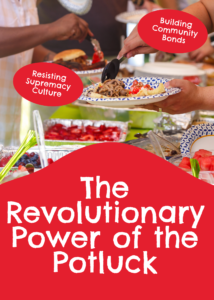The Revolutionary Power of the Potluck:
Building Community Bonds and Resisting Supremacy Culture
In an age of fast-paced consumerism and individualism, organizing a simple potluck—whether in a backyard or park—becomes a revolutionary act. It’s an act of mutual aid, a quiet resistance to supremacy culture, and a powerful step toward building class-conscious, inclusive spaces. A potluck isn’t just a meal; it’s an intentional gathering where people across income levels, backgrounds, and identities come together, share resources, and make commitments. It’s a means of creating a community that values care over consumption, people over profit, and genuine relationships over transactional exchanges. Even if there’s no explicit “political” theme, the event itself sows seeds of social change by normalizing a culture of sharing and interdependence.
Potlucks as Mutual Aid and Anti-Capitalist Practice
At its core, a potluck embraces the principle of mutual aid. Every participant brings something, contributing what they can and sharing what they have, creating a meal that no one person could provide alone. This type of gathering emphasizes shared responsibility and common care, a counterpoint to capitalist structures that encourage self-reliance over community and favor those who “can afford” over those who cannot. Here, the focus isn’t on what’s most expensive or elaborate, but on what each person can meaningfully offer. Even guests with fewer resources can contribute, whether it’s a simple dish, utensils, or simply showing up and helping set up or clean up.
This informal redistribution of food and resources allows for a momentary release from capitalism’s constant pressure. When people come together in this way, they’re making a small but powerful statement: that a joyful, meaningful experience doesn’t have to come with a price tag or a profit margin. Instead of viewing social gatherings as a consumer experience, a potluck reinforces that we don’t need to “buy” our way into relationships or seek social validation through what we can afford. When a community provides for itself, it carves out a space, however small, that rejects the endless loop of production, consumption, and waste in favor of something far more valuable: connection.
Building Class-Conscious Socializing
In the inclusive space of a potluck, class distinctions blur. People of different income levels contribute as equals, and it doesn’t matter if one dish is more costly or if someone’s offering is humble. What matters is the thoughtfulness and care behind the contribution, and the genuine sense of community that builds as people sit side by side. At a well-designed potluck, the person bringing a homemade soup sits at the same table as the person who brought a bakery cake, and the conversation flows freely among them. This is the beginning of class-conscious socializing, where people begin to see each other not as financial equals but as human equals, with shared needs and the capacity to contribute to each other’s well-being.
Potlucks like this one subtly dismantle the “transactional” mindset. In many social spaces, interactions are defined by what people can do or provide for each other; wealthier guests might feel pressured to fund the gathering, or those with fewer resources might feel as though they’re “taking” from others. A potluck, however, levels the playing field. By normalizing an event where everyone’s contributions are equally valued, a potluck undermines supremacy culture, which often elevates certain voices, perspectives, and incomes over others.
Practicing Commitment and Care
Potlucks also serve as a platform for practicing commitments and accountability within a community. To make the event successful, guests communicate about what they’re bringing and follow through on their commitments. It’s a simple but profound exercise in mutual respect and responsibility. By setting a clear expectation that everyone will contribute—whether it’s a dish, drink, or even a few napkins—guests learn to show up for each other in small but meaningful ways.
Thoughtfulness is another essential component. A well-organized potluck considers everyone’s needs, including dietary restrictions, food allergies, and other accessibility concerns. Vegan options, food labels, gluten-free items, and a variety of non-alcoholic beverages are small but important ways to make everyone feel welcome and included. These choices reflect a deep, compassionate commitment to making the space safe and welcoming for all, mirroring the kind of attentiveness required for true community care. This level of thoughtfulness is itself a step toward social justice, as it builds a habit of prioritizing inclusivity and equity in everyday actions.
Why Potlucks are a Small Act of Resistance
Potlucks may not immediately dismantle systemic oppression, but they are acts of resistance when designed intentionally. By bringing people together across different backgrounds and classes, they lay the groundwork for collective understanding and solidarity. The simplicity of the event—the shared food, the open conversation—creates a setting where people naturally learn to support one another and recognize their interdependence. Supremacy culture thrives on isolation, separation, and competition. A potluck, by contrast, thrives on togetherness, sharing, and collaboration. When individuals can create spaces of care and connection, they’re practicing a form of micro-resistance, gradually shifting norms away from individualism and supremacy culture.
In the end, the potluck is a template for a more just world. It fosters the skills and values—communication, responsibility, attentiveness—that are foundational to social change. While not every potluck will result in overt activism or social justice outcomes, it nevertheless represents a step toward a culture where people feel empowered to show up for each other, regardless of income or status. It’s a small, accessible act of resistance that reminds us of the world we’re capable of creating when we choose mutual aid over self-interest and community over competition.
In a society often ruled by scarcity mindsets, isolation, and inequity, a potluck can be a revolutionary gesture. It’s a simple way to reject the systems that seek to divide us and instead build something that brings people together—one shared meal at a time.

